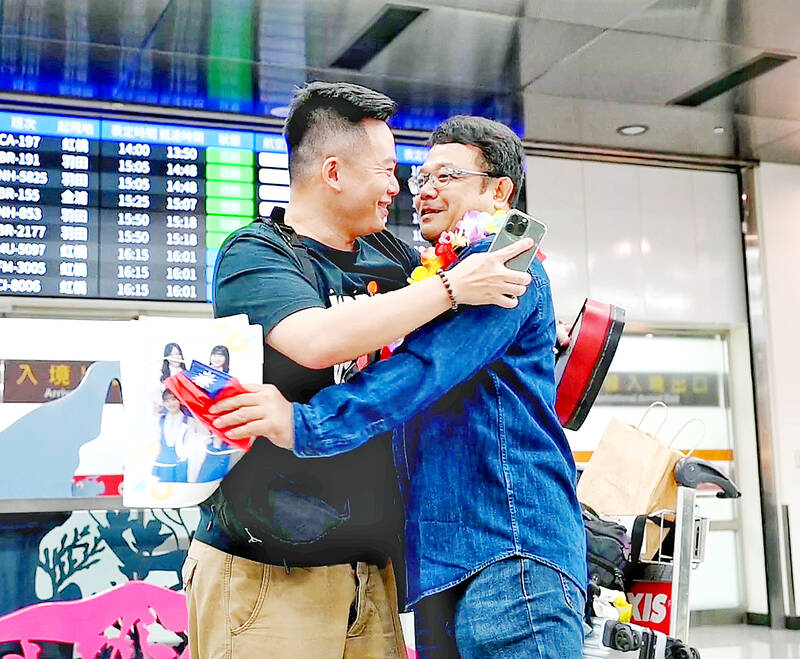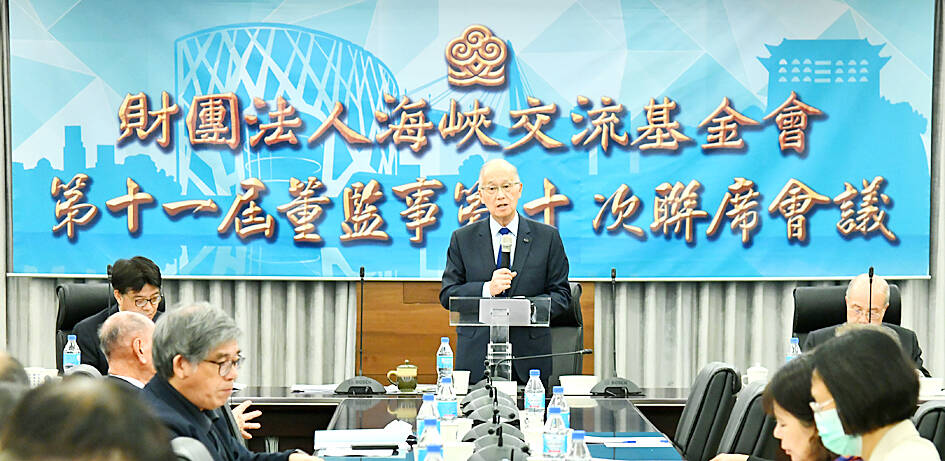Morrison Lee (李孟居), who was imprisoned in China for 22 months on spying charges, arrived in Taiwan yesterday.
Lee knelt to kiss the ground twice upon his arrival at Taipei International Airport (Songshan airport), saying that he was overcome with joy to return after 1,475 days.
“This is the land of freedom,” he said. “I will never go to China again.”

Photo: Fang Pin-chao, Taipei Times
“I will use my experience to tell Taiwanese: If you go to China, Hong Kong or Macau, you really must be very careful,” he told reporters.
Lee was an unpaid adviser to Pingtung County’s Fangliao Township (枋寮) when he was arrested in 2019 while traveling from Hong Kong to Shenzhen for business.
He was convicted on espionage charges and handed a 22-month sentence. After completing the sentence in 2021, the Chinese government prohibited him from leaving China for two more years.

Photo courtesy of the Straits Exchange Foundation
He was allowed to leave in July, but was not allowed on a flight to Taiwan, so he flew to Japan, where he stayed until yesterday.
On Friday, Straits Exchange Foundation Chairman David Lee (李大維) said that China’s Counter-Espionage Law is not conducive to stable cross-strait exchanges.
Exchange programs and reciprocal visits have restarted with the easing of COVID-19 restrictions and the Mainland Affairs Council (MAC) has announced measures to open up to Chinese tourists.
“Tourism and people-to-people interactions are the best ways to bolster mutual understanding between the two sides, but China on July 1 promulgated a revised Counter-Espionage Law, which has new provisions that substantially expand the scope of activities that Chinese authorities consider espionage,” David Lee said.
Media have reported cases of Taiwanese being confined in China or facing “unfriendly treatment,” he said. “The Chinese government should know that such incidents are not conducive to cross-strait peace and stability.”
“Taiwanese should exercise caution in their speech and action while in China to avoid breaching its laws,” he added.
China is facing an economic crisis, with Chinese property developers defaulting on debts among the financial woes, while the youth unemployment rate has been climbing for six months, reaching 21.3 percent in June, David Lee said.
Beijing in July stopped releasing youth unemployment data, so the actual situation might be even worse, he said.
Separately, a national security official warned Taiwanese about traveling to Chongqing, which on Friday promulgated a Counter-Espionage Regulation.
It is the first local law that connects to the central government’s Counter-Espionage Law, giving the megacity the legislative instrument to fight spying by Chinese and foreigners, said the official, who declined to be named.
The regulations allow Chinese authorities to “make arbitrary arrests,” creating a “minefield” for Taiwanese, the official said.
The MAC last week issued a warning to Taiwanese, listing things they should refrain from saying in China, as they can be interpreted as “attempting to obtain state secrets” or “spying activities,” the official said.
The decision to stop releasing data on youth unemployment, as well as real-estate, foreign direct investment, stock market trading, COVID-19 deaths, unfavorable information about Chinese academia, and personal information about Chinese politicians are topics to avoid, the official said.

A magnitude 4.9 earthquake struck off Tainan at 11:47am today, the Central Weather Administration (CWA) said. The hypocenter was 32.3km northeast of Tainan City Hall at a depth of 7.3km, CWA data showed. The intensity of the quake, which gauges the actual effect of a seismic event, measured 4 in Tainan and Chiayi County on Taiwan's seven-tier intensity scale, the data showed. The quake had an intensity of 3 in Chiayi City and County, and Yunlin County, while it was measured as 2 in Kaohsiung, Nantou County, Changhua County, Taitung County and offshore Penghu County, the data showed. There were no immediate reports of

‘DENIAL DEFENSE’: The US would increase its military presence with uncrewed ships, and submarines, while boosting defense in the Indo-Pacific, a Pete Hegseth memo said The US is reorienting its military strategy to focus primarily on deterring a potential Chinese invasion of Taiwan, a memo signed by US Secretary of Defense Pete Hegseth showed. The memo also called on Taiwan to increase its defense spending. The document, known as the “Interim National Defense Strategic Guidance,” was distributed this month and detailed the national defense plans of US President Donald Trump’s administration, an article in the Washington Post said on Saturday. It outlines how the US can prepare for a potential war with China and defend itself from threats in the “near abroad,” including Greenland and the Panama

The Chinese Nationalist Party (KMT) is maintaining close ties with Beijing, the Democratic Progressive Party (DPP) said yesterday, hours after a new round of Chinese military drills in the Taiwan Strait began. Political parties in a democracy have a responsibility to be loyal to the nation and defend its sovereignty, DPP spokesman Justin Wu (吳崢) told a news conference in Taipei. His comments came hours after Beijing announced via Chinese state media that the Chinese People’s Liberation Army’s Eastern Theater Command was holding large-scale drills simulating a multi-pronged attack on Taiwan. Contrary to the KMT’s claims that it is staunchly anti-communist, KMT Deputy

RESPONSE: The government would investigate incidents of Taiwanese entertainers in China promoting CCP propaganda online in contravention of the law, the source said Taiwanese entertainers living in China who are found to have contravened cross-strait regulations or collaborated with the Chinese Communist Party (CCP) could be subject to fines, a source said on Sunday. Several Taiwanese entertainers have posted on the social media platform Sina Weibo saying that Taiwan “must be returned” to China, and sharing news articles from Chinese state media. In response, the Mainland Affairs Council (MAC) has asked the Ministry of Culture to investigate whether the entertainers had contravened any laws, and asked for them to be questioned upon their return to Taiwan, an official familiar with the matter said. To curb repeated